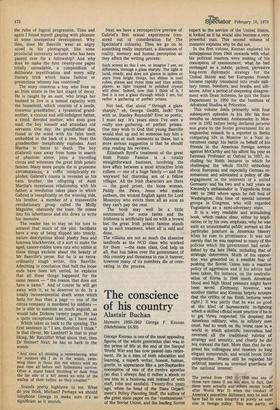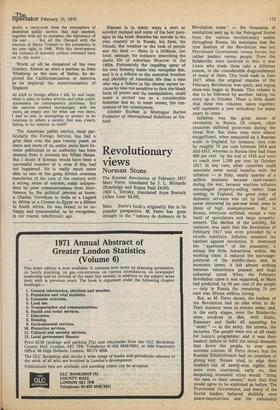The conscience of his country
Alastair Buchan
Memoirs 1950-1963 George F. Kerman (Hutchinson £4.50) George Kennan is one of the most appealing figures of the whole generation that was in the prime of life at the end of the Secqnd World War and has now passed into retirement. He is a man of both education and learning, a 'superb writer, 'honest, human, gentle, in appearance like a pre-Raphaelite conception of one of the twelve apostles (so !that I always find it rather a Shock to see him in a business suit instead of with staff, robe and sandals). Twenty-five years ago, 'when he head of the State Department's Policy Planning Staff, the author Of the great state paper on the ' containment ' of the Soviet Union, and the leading Soviet expert in the service of the United States, it looked as if he would also become a very powerful man. This second volume of memoirs explains why he did not.
In the first volume, Kennan explored his unhappiness from 1948 onwards with what his political masters were making of his conception of containment; what he had envisaged as a subtle, patient, pervasive long-term diplomatic strategy for the United States and her European friends became rapidly translated into crude military terms, bombers, 'and bombs and alliances. After a period of deepening disagreement with Dean Acheson, he quit the State Department in 1950 for the Institute of Advanced Studies at Princeton.
This volume deals primarily with four subsequent episodes 'in his life: his four months as American Ambassador in Moscow in 1952 before being declared persona non grata by the Soviet government for an 'unguarded remark to a reporter in Berlin comparing life in Moscow to a Nazi internment camp: his battle on behalf of his friends in the American foreign service against MCCarthy and his 'allies: his year as Eastman Professor at Oxford in 1957, including his Reith lectures in which he challenged the whole NATO orthodoxy about European and especially German rearmament and advocated a policy of disengagement in the interests of a united Germany: and his two and a. half years as Kennedy's ambassador in Yugoslavia from 1961 to 1963 where again he fell foul of Washington, this time of special interest groups in Congress, who still regarded Yugoslavia as a semi-adversary state.
It is a very readable and 'stimulating book, which makes clear, either by implication or by 'his own emphasis, why he was such an unsuccessful public servant at the particular juncture in Anterican history when he rose to prominence. It was not merely that he was opposed to many of the policies which his government had established by the late 1940s, including that of strategic deterrence. Much of his opposition was grounded on a sensible fear of pushing the Soviet Union into a reactive policy of aggression and if his advice had been taken, for instance, on the neutralisation of Korea in 1948 much American blood and 'high blood pressure might have been saved. (Germany, however, was another matter and Kennan largely accepts that the critics of 'his Reith lectures were right.) It was partly that he was no good at the kind of 'bureaucratic in-fighting which a skilled official must practice if he is to get views respected. He despised the American military, who, as military men must, had to work on the worst case in, a world in which scientific innovation had reversed all the traditional rubrics of strategy 'and security, and clearly he did not 'conceal the fadt. More than that he exposed his colleagues and masters to long elegant memoranda, and would brook little compromise. Worse still he regarded his political masters as unsound 'guardians of the national interest: The period from 1945 to 1949 was one of those rare times (I am not sure, in fact, that there were actually any others except briefly after World War I) when the conduct Of America's peacetime diplomacy may be said to have had its own integrity as purely an exercise in foreign policy. This was partly, na doubt, a carry-over from the atmosphere of dedicated public service that had marked, together with all its mistakes, the diplomacy of the war . . . But all this changed with the election of Harry Truman to the presidency in his own right, in 1948. With this development the vultures of domestic politics swarmed back on to the scene . . .
Worst of all he despaired of his own country. Almost as stern a puritan as John Winthrop or the men of Salem, he deplored the Californianisation of America as he deplored the Americanisation of England.
So stick to foreign affairs I did, by and large, when it came to books, articles and other public statements on contemporary problems. But the exercise seemed increasingly, with the years, an empty one; for what use was there, I had to ask, in attempting to protect in its relations to others a society that was clearly failing in its relation to itself?
The American public service, most particularly the Foreign Service, has had a grim time over the past twenty years, as more and more of its senior posts have become politicised or as authority has been drained from it towards the White House. But I doubt if Kennan would have been a successful member of it even if this had not happened. He is really much more akin to one of the great British overseas mandarins of the turn of the century with a strong sense of mission, made independent by poor communications from interference by the political process at home, a Charles Trevelyan in India or a Lugarcl in Africa or a Cromer in Egypt or a Milner in South Africa. He was bound to be unhappy and unsuccessful, as he recognises, in our coarse, telechtronic age. Kerman is in many ways a poet or novelist manqué and some of the best passages in his book describe his travels in his own country or in Russia, his farm, his friends, the weather or the look of people and the land — (there is a brilliant, too brief, passage, for instance, describing the dasha life of suburban Moscow in the 1950s. Fortunately the impaling spear of his own (honesty made him recognise this, and it is a tribute to (the essential freedom and plurality of American life that a man who was a failure in his !chosen career because (he was too sensitive to face the bleak facts of power and its manipulation, could make a second one as a considerable historian and as, in some senses, the conscience of his countrymen.
Alastair Buchan is Montague Burton Professor of International Relations at Oxford.



































 Previous page
Previous page